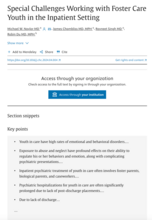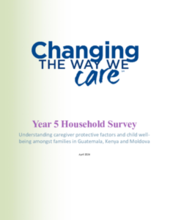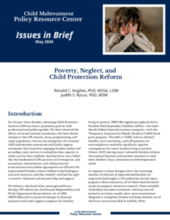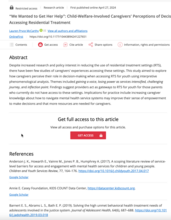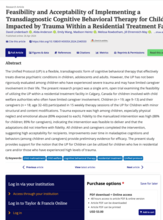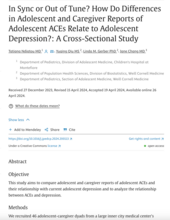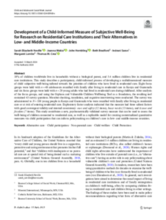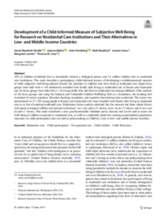This page contains documents and other resources related to children's care in the Americas. Browse resources by region, country, or category.
Displaying 31 - 40 of 1438
This article details to unique challenges faced by youth in care in the US when receiving inpatient treatment and how that varies in several ways from the care of non-foster care youth. Children in care have more medical, behavioral, and psychiatric problems and require health care at higher rates than youth not engaged in the child welfare system.
The Changing the Way We Care (CTWWC) initiative conducted its Year 5 Household Survey as part of its commitment to building evidence around outcomes for children and families in the context of care reform. The second round of this survey in Kenya and Guatemala, and first round in Moldova, aimed to understand the impact of CTWWC interventions on children and families transitioning from residential care to family-based alternatives or receiving support to prevent separation.
This webinar aimed to create space for reflection on how child rights, parental rights, and family values intersect within faith communities and in public discourse.
The purpose of this document is to explore why and how Child Protective Services (CPS) evolved from a highly specialized system designed to investigate and respond to allegations of serious child abuse and neglect to a system expected to provide social services and material supports to impoverished families unable to meet their children’s basic needs.
This U.S.-based study aimed to explore how caregivers perceive their role in decision-making when accessing residential treatment settings (RTS) for youth using interpretive phenomenological analysis.
This research project was an open trial examining the feasibility of utilizing the Unified Protocol (UP) -- a form of cognitive behavioral therapy -- within a residential treatment facility in Calgary, Canada for children involved with child welfare authorities who often have limited caregiver involvement.
The purpose of this U.S.-based study was to compare adolescent and caregiver reports of adolescent adverse childhood experiences (ACEs) and their relationship with current adolescent depression and to analyze the relationship between ACEs and depression.
In this episode Amanda Griffith of Family for Every Child is joined by representatives of three member organisations who are working to support children's mental health and wellbeing across three continents.
This study describes a participatory, child-informed process of developing a multidimensional measure of child subjective well-being tailored towards the priorities of children who have lived in residential care. The survey was administered to 180 young people in Kenya and Guatemala who were reunified with family after living in residential care or at risk of entering residential care.
This study describes a participatory, child-informed process of developing a multidimensional measure of child subjective well-being tailored towards the priorities of children who have lived in residential care. The study was conducted with focus groups in Kenya and Guatemala.


